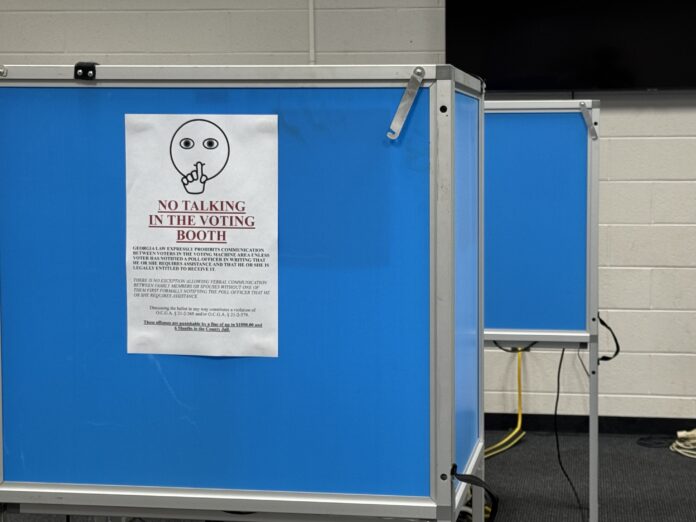
Advance voting for the Georgia Public Service Commission primary is underway. For most counties in the state, voter turnout has been extremely low.
At the Habersham North Precinct inside the Ruby Fulbright Aquatic Center in Clarkesville, the smell of chlorine and the drone of the building’s AC units were all that filled the voting booths at noon on Wednesday. Several poll workers sat patiently by waiting for voters.
“Most people come in and say, ‘what are we voting for? I had no idea,'” said Amy Espinosa, a poll worker at the aquatic center.
What are we voting on?
What many Georgians may not realize is this primary election’s potential to create significant financial consequences for their homes and businesses. The PSC regulates the state’s telecommunications, gas, and electric utilities. The Commission has exclusive power to decide what are “fair and reasonable rates” for these services.
According to the PSC website, the panel “must balance Georgia citizens’ need for reliable services and reasonable rates with the need for utilities to earn a reasonable return on investment.”

The Election Data Hub on the Georgia Secretary of State’s website shows that, as of June 11, there had been 1,261 votes cast in the PSC election across Habersham, White, Hall, Banks, Stephens, and Lumpkin counties. This means that half of one percent of all active voters in these counties have voted in the PSC primary.
Only 48,058 eligible voters have cast ballots statewide— a 0.6% voter turnout.
Washington County currently has the highest turnout in the state with 1,669 votes cast.
First time voting for PSC in years
For the past two election cycles, PSC elections were canceled due to an ongoing voting rights lawsuit challenging the election process itself.
As a result, three commissioners have remained in their positions and continued to vote on important matters without facing the electorate as originally scheduled. This year, two of those commissioners, Republicans Tim Echols and Fitz Johnson, are on the ballot.
Candidates must reside in the districts in which they’re running. However, they are elected at large, meaning all eligible registered voters in the state may vote on them.
This year’s races include candidates in District 2, which spans parts of East Georgia, including Augusta and Savannah, and District 3, which covers the three Atlanta-area counties of Clayton, DeKalb, and Fulton.
Since this is a primary, voters must declare which party primary they are voting in.
The only primary choice in District 2 is on the Republican side, where incumbent Tim Echols faces challenger Lee Muns. The winner of the District 2 GOP primary will face Democrat Alicia Johnson in November.
In District 3, the choice is on the Democratic side among Peter Hubbard, Robert Jones, and Keisha Sean Waites. They’re vying for a chance to challenge incumbent Republican Fitz Johnson in the fall.
A fourth declared Democratic candidate for District 3, Daniel Blackman, was disqualified from the race for failing to meet residency requirements.







